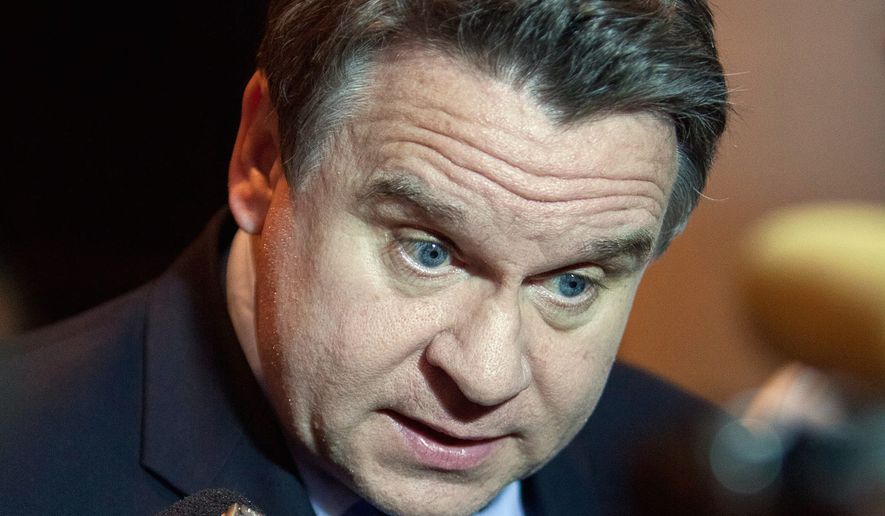Rep. Chris Smith’s first brush with China and the Olympics was in the early 1990s when he met Wei Jingsheng for dinner with Beijing’s secret police sitting a few feet away.
The communist government had released the famous dissident as part of its charm offensive to host the 2000 Summer Games, only to rearrest him after it came up short.
Beijing secured the 2008 edition, prompting the New Jersey Republican to fly back to China to highlight the fact that dissidents were being rounded up to avoid unflattering press before the opening ceremonies.
Fourteen years later, Beijing is prepping its Olympic Village and slopes of Hebei Province for the Winter Games in February even as the State Department says the communist government continues to engage in genocide and crimes against humanity against Muslim Uyghurs and other minorities in western China.
Mr. Smith is finding it hard to stomach.
“It’s an absolutely false premise China ameliorates its behavior when you reward them with the Olympics,” Mr. Smith told The Washington Times. “What a cruel joke that is. When are we going to learn the lesson that this is a malevolent dictatorship? We want to stand with the oppressed, not the oppressor.”
Mr. Smith is set to co-chair a bipartisan hearing Tuesday that will scrutinize China’s brutal crackdown on religious minorities and democratic dissent in Hong Kong amid growing calls for nations to withdraw from the approaching Winter Games.
The hearing before the Tom Lantos Human Rights Commission and Congressional-Executive Commission on China will include testimony from Human Rights Watch, experts on Chinese President Xi Jinping’s behavior and outspoken critics of the authoritarian regime.
It comes one day after a coalition of advocates for the Uyghurs and other persecuted persons in China called for an all-out boycott of the games scheduled for Feb. 4-20, or six months after the scheduled conclusion of the Tokyo Summer Games that are grabbing headlines during the COVID-19 pandemic.
Mr. Xi is wielding a vast surveillance network and labor camps against religious minorities in Xinjiang to restrict their movement under the guise of counterterrorism efforts or vocational training. The brutal tactics come on top of Beijing’s suppression of Hong Kong and Tibet and aggression toward Taiwan.
Making matters worse, Mr. Smith said the coronavirus killed 26,000 people in his state alone and there’s been no accountability from Beijing about the pathogen’s origins in Wuhan, China.
“It’s the full portfolio and now it is made much worse by the fact it is committing genocide,” Mr. Smith said.
He said legislatures throughout the world need to debate whether they want to hand another showcase to Mr. Xi.
“This is not unlike what happened in ’36,” Mr. Smith said, referring to the Olympics in Berlin hosted by the Nazi regime. “We have a genocide that’s been declared by the previous administration, this administration.”
The hearing will be held virtually and co-chaired by Rep. Jim McGovern, Massachusetts Democrat, and Sen. Jeff Merkley, Oregon Democrat.
Efforts to spotlight the issue received a big boost from the launch of “Boycott Beijing 2022” on Monday.
“The Chinese government is committing genocide against the Uyghur people and waging an unprecedented campaign of repression in East Turkistan, Tibet and Southern Mongolia, as well as an all-out assault on democracy in Hong Kong. At the same time, the Chinese Communist Party is engaged in a merciless crackdown on Chinese human rights defenders, activists, faith communities and journalists, and implementing an intense strategy of intimidation and geopolitical bullying against Taiwan,” the coalition said on its website.
“Participating in the Beijing Olympic Games at this time would be tantamount to endorsing China’s genocide against the Uyghur people, and legitimizing the increasingly repressive policies of the totalitarian Chinese regime,” it said.
Beijing, which defeated Almaty, Kazakhstan, in 2015 to win the Winter Games bid, denies that it is committing crimes against humanity in Xinjiang and says a boycott of the Olympics on human rights grounds is “doomed to failure.”
This year’s Summer Games in Japan were postponed for a year and are still in doubt because of the pandemic, so the International Olympic Committee faces an immediate challenge that has overshadowed the Beijing controversy.
Mr. Smith said it may be possible to find another venue, though time is running out and they probably can’t wait for the Tokyo situation to play out.
“It is not undoable if there is the political will,” Mr. Smith said. “I love sports. There’s no doubt I want to see the athletes compete, but in a different city.”
The IOC says it takes labor rights and other issues seriously and has discussed them with China and rights groups, but it maintains an apolitical stance.
“The Olympic Games are the only event that brings the entire world together in peaceful competition. They are the most powerful symbol of unity in all our diversity that the world knows. In our fragile world, the power of sport to bring the whole world together, despite all the existing differences, gives us all hope for a better future,” the IOC told The Washington Times. “Given the diverse participation in the Olympic Games, the IOC must remain neutral on all global political issues. Awarding the Olympic Games to a National Olympic Committee (NOC) does not mean that the IOC agrees with the political structure, social circumstances or human rights standards in its country. The Olympic Games are governed by the IOC, not by governments.”
The committee said it, not governments, invite athletes to the games and the host country’s head of state is allowed to say only one sentence, scripted by the IOC, to officially open the events.
Mr. Smith said the issue before his panel isn’t political. It’s about basic rights.
“People are being grossly victimized,” he said, “and the victimizer is being rewarded by the IOC.”
• Tom Howell Jr. can be reached at thowell@washingtontimes.com.




Please read our comment policy before commenting.